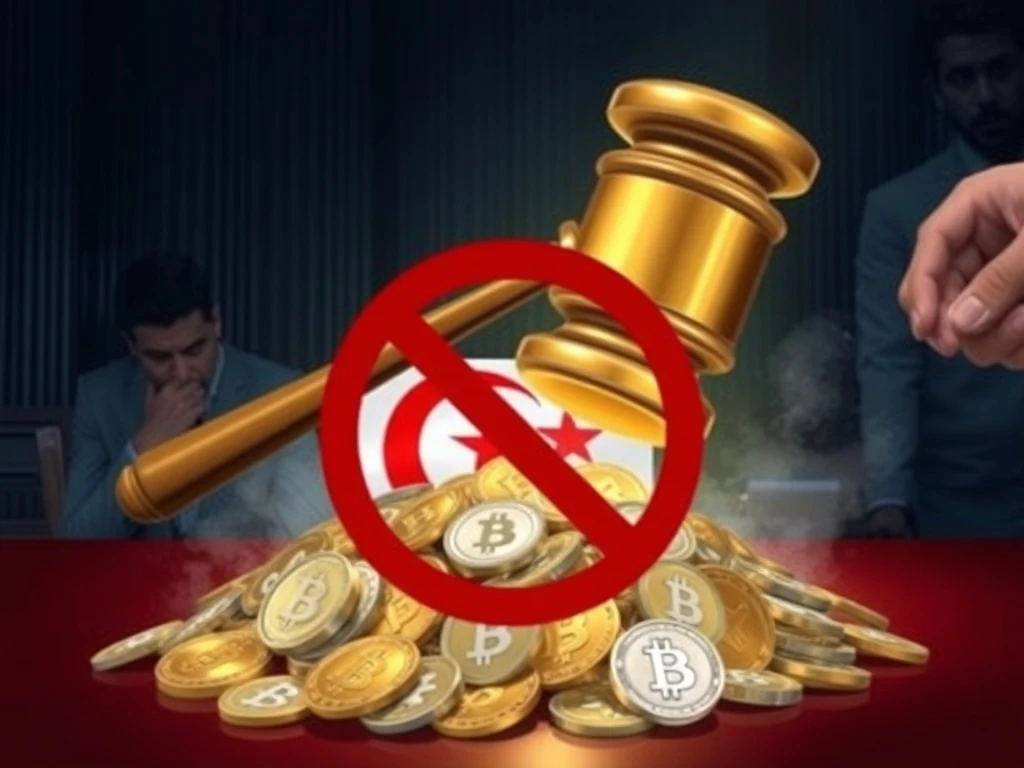Algeria’s Shocking Crypto Ban: How the New AML/CTF Law Crushes Digital Assets

In a bold and controversial move, Algeria has criminalized all cryptocurrency activities under a new AML/CTF law. This sweeping ban targets holding, trading, mining, and even promoting digital assets, leaving crypto enthusiasts in the country facing severe penalties. But what does this mean for the future of crypto in Algeria and beyond?
Algeria’s Crypto Ban: What You Need to Know
The Algerian government has enacted Law No. 25-10, which prohibits all cryptocurrency-related activities. Key aspects of the ban include:
- Complete prohibition of buying, selling, or holding digital assets
- Criminalization of cryptocurrency mining operations
- Ban on promoting or advertising crypto services
- Severe penalties for violations
Why Did Algeria Implement This AML/CTF Law?
The government cites anti-money laundering (AML) and counter-terrorist financing (CTF) concerns as primary reasons for the ban. However, analysts suggest additional motivations:
| Reason | Explanation |
|---|---|
| Financial Stability | Protecting the traditional banking system |
| Currency Control | Preventing capital flight through crypto |
| Regulatory Alignment | Following global trends in crypto restrictions |
Impact of Cryptocurrency Restrictions in Algeria
The immediate effects of the ban are already being felt:
- Crypto businesses must shut down operations immediately
- Individual holders face legal risks for simply owning digital assets
- Potential growth of underground P2P trading networks
- Possible chilling effect on fintech innovation in the country
Global Context of Digital Assets Prohibition
Algeria joins several nations with strict crypto regulations:
- China: Complete ban since 2021
- Egypt: Restrictions on crypto trading
- Turkey: Limitations on crypto payments
Unlike some countries that regulate rather than ban, Algeria’s approach is among the most severe.
Enforcement Challenges of Crypto Regulations
While the law is strict, implementation faces hurdles:
- Difficulty tracking decentralized transactions
- Potential for VPN use to bypass restrictions
- Challenges in proving crypto ownership
- Need for international cooperation to be fully effective
What’s Next for Crypto in Algeria?
The long-term effects remain uncertain, but possible outcomes include:
- Increased underground crypto activity
- Potential capital flight through alternative channels
- Possible future reconsideration if enforcement proves difficult
- Impact on Algeria’s fintech sector development
Algeria’s crypto ban represents one of the most aggressive stances against digital assets worldwide. While aimed at protecting financial stability, the move may inadvertently push crypto activity underground while stifling technological innovation. As the global crypto landscape evolves, all eyes will be on how effectively Algeria can enforce these strict new regulations.
Frequently Asked Questions
What exactly does Algeria’s crypto ban prohibit?
The ban prohibits all cryptocurrency-related activities including buying, selling, holding, mining, and promoting digital assets.
What are the penalties for violating Algeria’s crypto ban?
While specific penalties aren’t detailed in the law, violations are considered criminal offenses that could result in fines or imprisonment.
Can Algerians still access cryptocurrencies through VPNs?
Technically yes, but the law makes even possession illegal, so using VPNs to access exchanges would still be prohibited.
How does Algeria’s ban compare to other countries’ crypto regulations?
Algeria’s approach is among the strictest, banning all activities rather than implementing regulatory frameworks like some other nations.
Will the ban affect international crypto transactions involving Algerians?
Yes, the law applies to all crypto activities regardless of where they originate, affecting cross-border transactions.
Is there any chance Algeria might reverse this ban in the future?
While possible, the current government shows no signs of reconsidering, though enforcement challenges might prompt future policy reviews.









